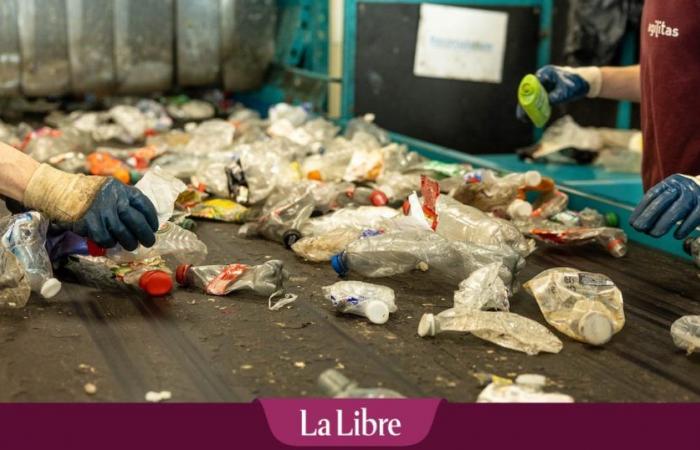Valérie Bruyninckx, spokesperson for Fost Plus, cannot explain the reasons for this increase. “Identifying the reasons for the increase in sorting errors is difficult. It may be a case of forgetting the rules, a lack of interest in recycling or a mix between these two reasons. What is certain is that we find more and more objects in blue bags that should not be there and which pose many problems in terms of recycling and security.”, deplores our interlocutor.
In 2019, the list of waste accepted in blue bags was extended with the aim of increasing the quantity of recyclable waste, but also to make life easier for citizens. For five years now, bottles and flasks, trays, containers and boxes, pots and tubes, plastic films and bags and drink capsules have been accepted in PMC bins.
In the process, six new sorting centers were created to absorb this new mass of waste. Among these new specialized infrastructures, the Tri Val’Up center, nestled in the Mons region, which processes the blue bags of nearly 2 million Belgians each year, or no less than 60,000 tonnes of PMC per year, collected through Belgium, from Mons to Knokke via Rhode-Saint-Genèse.
Five kilometers of waste
This center employs around a hundred people. Men and women, young and old, who spend their days in the middle of an immense maze of conveyor belts littered with cans, aluminum trays and plastic bottles, but also with toys, pieces of fridge boxes and other unidentified objects, in an indescribable noise and an equally indescribable smell. Placed end to end, these conveyor belts measure five kilometers, a minimum for processing several batches of blue bags daily.
“The sorting operators work on the belts to correct what the automatic sorting failed to do. There are around twenty of them working at the same time. Any material that comes in here goes in front of someone. Why? Because optical sorters miss things, do not have the possibility of sorting certain materials for certain reasons, in particular because of sorting errors by citizens. We have no other choice but to hire people to do what. automation failed to do.”, explains Nathalie Halbot, director of the Val’Up center.
Three years ago, a fire attributed to careless trash bins almost cost the lives of people responsible for carrying out this screening.
Nearly 767 tonnes of waste collected on Walloon highways in 2023
“We started our activities in November 2021 and at the end of January, we were on fire. This led to a week of downtime and 160,000 euros in damage. Fortunately, there were no injuries. We didn’t find the incriminated material, but we suspected a lithium battery. We found phenomenal quantities of it, and not just batteries but everything that goes with them: toys, remote controls, smartphones, etc.”, continues our interlocutor. And to specify: Anything that is steel too, we find a lot of it and it can be dangerous. We know that it is one of the risks of the job but we prefer to avoid it. Steel is a press that makes small packages and it sometimes catches fire, probably because of a gas cylinder. People don’t realize the risks they pose to our staff with this kind of waste.”
Syringes and baxters
But fires are not the only dangers that await employees of PMC sorting centers. “There is something even more serious: syringes and baxters. The workers wear cut-resistant gloves, we have tried a whole bunch of things and equipment to protect them but at one point, a syringe that passes through, it pierces. Often, people try to hide them at the bottom of bags and they are found in bags all tied up. When a worker is stung, there is a whole follow-up procedure with blood testing, etc. But seriously? Who imagines going to put a syringe in a PMC?” deplores the director of Val’Up.
How Wallonia is tackling organic waste sorting
“It is for this reason that we are trying to raise awareness on our side, to receive schools and industrialists to spread the good word. If the citizen respected the simple instructions in the folder: flatten the bottles, empty them, do not leave butter, lasagna, smoked fish… If all these rules were correctly respected, that would remove 85 to 90% of our sorting difficulties. And I’m not talking about residues, which in our jargon refers to materials that should not. not be in the bags, because it still follows a very specific path that the sorter must also monitor.”
Cost for the community
Especially since these sorting errors also have a cost for the community. “Processing a ton of poorly sorted waste costs 1,000 euros. Processing 40,000 tonnes of sorting errors therefore costs around 40 million euros.indicates Valérie Bruyninckx, spokesperson for Fost Plus.






